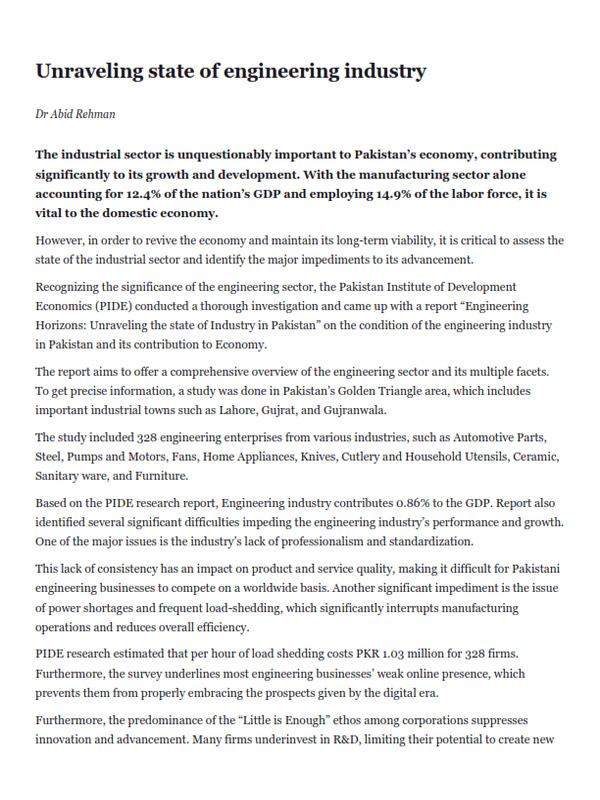Unraveling state of engineering industry
The industrial sector is unquestionably important to Pakistan’s economy, contributing significantly to its growth and development. With the manufacturing sector alone accounting for 12.4% of the nation’s GDP and employing 14.9% of the labor force, it is vital to the domestic economy.
However, in order to revive the economy and maintain its long-term viability, it is critical to assess the state of the industrial sector and identify the major impediments to its advancement.
Recognizing the significance of the engineering sector, the Pakistan Institute of Development Economics (PIDE) conducted a thorough investigation and came up with a report “Engineering Horizons: Unraveling the state of Industry in Pakistan” on the condition of the engineering industry in Pakistan and its contribution to Economy.
The report aims to offer a comprehensive overview of the engineering sector and its multiple facets. To get precise information, a study was done in Pakistan’s Golden Triangle area, which includes important industrial towns such as Lahore, Gujrat, and Gujranwala.
The study included 328 engineering enterprises from various industries, such as Automotive Parts, Steel, Pumps and Motors, Fans, Home Appliances, Knives, Cutlery and Household Utensils, Ceramic, Sanitary ware, and Furniture.
Based on the PIDE research report, Engineering industry contributes 0.86% to the GDP. Report also identified several significant difficulties impeding the engineering industry’s performance and growth. One of the major issues is the industry’s lack of professionalism and standardization.
This lack of consistency has an impact on product and service quality, making it difficult for Pakistani engineering businesses to compete on a worldwide basis. Another significant impediment is the issue of power shortages and frequent load-shedding, which significantly interrupts manufacturing operations and reduces overall efficiency.
PIDE research estimated that per hour of load shedding costs PKR 1.03 million for 328 firms. Furthermore, the survey underlines most engineering businesses’ weak online presence, which prevents them from properly embracing the prospects given by the digital era.
Furthermore, the predominance of the “Little is Enough” ethos among corporations suppresses innovation and advancement. Many firms underinvest in R&D, limiting their potential to create new and better goods and processes. Survey results show that 88% of surveyed firms prefer not to engage in R&D activities.
Mindset of entrepreneurs in small & medium-size firms is a hurdle in their growth. As a result, less industrial output or production leads to less Pakistan’s exports. Delays in customs clearance processes and a lack of a competitive edge exacerbate the engineering industry’s problems.
The report also highlights the interesting aspect that 95% of the firms reported not having a Line-of-Credit (LoC) or loan from any financial institution.
Moreover, the reality of only 5% of firms having a loan or LoC for their business operations suggests that the industry is not exhibiting much dynamism and growth restricted access to funding, political insecurity, unfavorable economic policies, excessive time spent on government compliance, and a lack of comprehensive training and development programs all add to the problems that engineering businesses experience in Pakistan.
In light of the aforementioned concerns, the report suggested many recommendations to overcome these difficulties and promote growth in the engineering business. First and foremost, it proposes that businesses obtain certification from appropriate bodies to verify compliance with quality standards. This would not only boost the prestige of Pakistani engineering goods but additionally foster trust in both home and international markets.
Furthermore, the government should prioritize strengthening commercial electricity supplies, with a particular emphasis on minimizing power outages through the deployment of alternate power sources. To support business growth and expansion, the report recommends the creation of special programs that provide firms with simple access to bank financing.
Limited access to finance encourages informal credit lending which excludes banks from the lower end of the lending market. Banks may initiate special schemes to provide credit to small and medium enterprises on easy terms to encourage business expansion.
Collaborative initiatives between industry groups and the Engineering Development Board (EDB) can be critical in developing a growth-oriented mentality among local businesses. Furthermore, engineering firms must have a strong online presence in order to extend their client base and capitalize on the tremendous potential given by the digital age.
Investing in R&D and executing labor education programs are also critical for increasing the competitiveness of engineering businesses. Businesses may remain ahead of the curve and react to shifting market dynamics by concentrating on product innovation and staff upskilling.
The government should prioritize tackling the underlying bottlenecks that impede corporate operations, fostering trust and collaboration between the public and private sectors.
Finally, the engineering sector in Pakistan has a number of problems that hamper its growth and potential. However, by adopting the report’s suggestions and addressing the highlighted challenges, the sector may overcome these impediments and realize its full potential.
It is critical for stakeholders, including the government, industry groups, and individual enterprises, to collaborate in order to create good change and foster an environment favorable to the expansion of the engineering sector. With the proper policies in place, Pakistan’s engineering industry may play an even larger role in the country’s economy, stimulating innovation, generating job opportunities, and contributing to overall economic growth.
In sum, the government may focus on addressing the underlying bottlenecks that hinder business operations so that time spent on government regulation can be minimized. This will create a trust surplus between government and businesses.
Copyright Business Recorder, 2023




